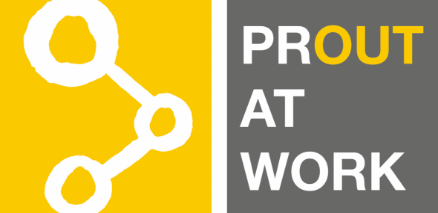PROUT AMPLIFIER EDITION
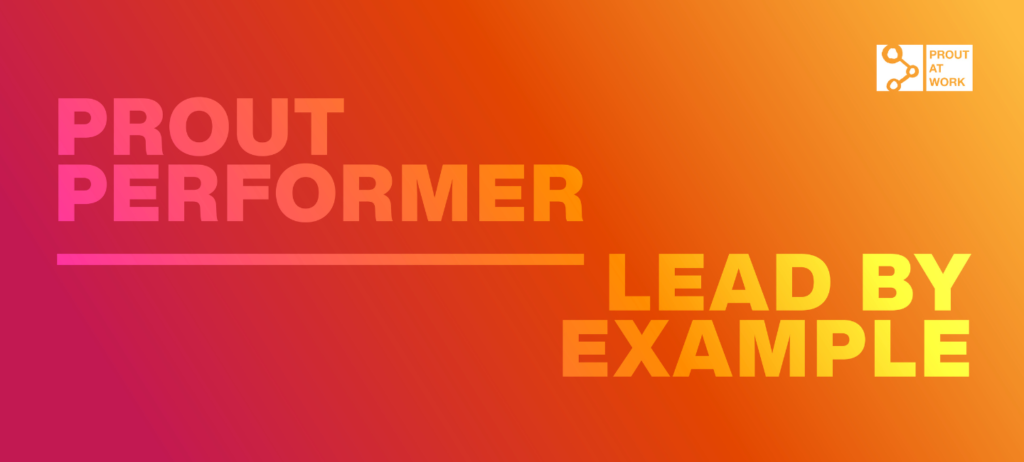
Diversity! But sustainable
On May 13, 2024, we were guests at one100 – the Randstad head office – in Eschborn. Despite spring thunderstorms over Frankfurt, we welcomed around 40 networkers to the first PROUT PERFORMER Networking Event 2024.
In an on-stage discussion with PROUT AT WORK board member Albert Kehrer, Frank Münze (Head of Talent & EDI&B), Carlotta Köster-Brons (Head of the Capital Office, National CSR Coordinator) and Bettina Desch (External Communications Expert) provided insights into the sustainability and EDI&B strategy at Randstad from various perspectives.
Afterwards, the guests had the opportunity – with a cool drink and a delicious snack in hand – to continue the exchange, talk about the challenges and opportunities of diversity work and share best practices from their own work contexts. Absolutely added value for the participants and super interesting for us too.
We were also very impressed by the guided tours of the impressive head office, where New Work is practiced in many different ways, from a flexible workplace to a fitness studio and a parent-child room, in order to meet the needs and requirements of employees in their day-to-day work.
Many thanks to all visitors, our hosts, co-organizers and the Randstad Pride BRG for their active support on site.
Impressions
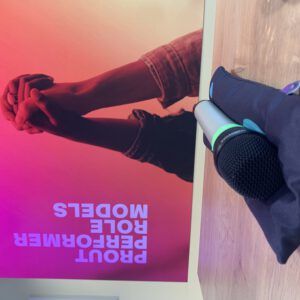
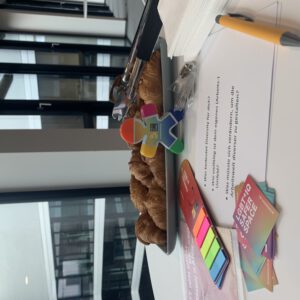
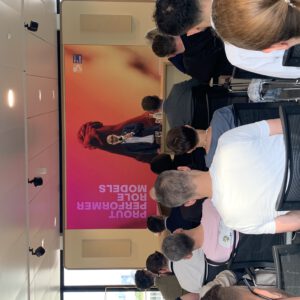
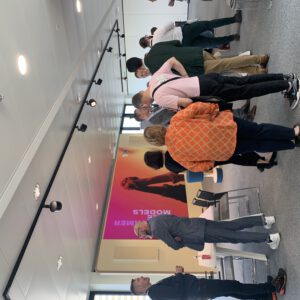
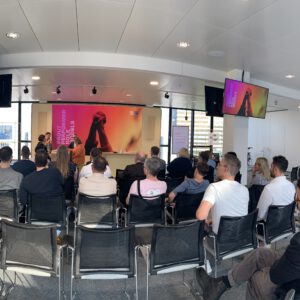
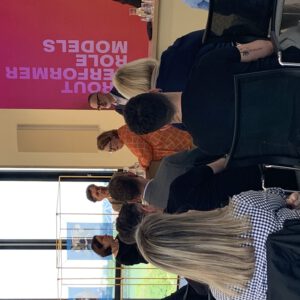
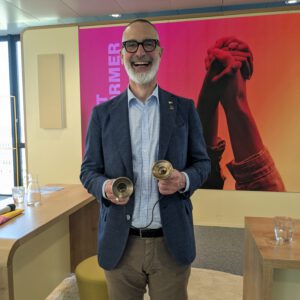
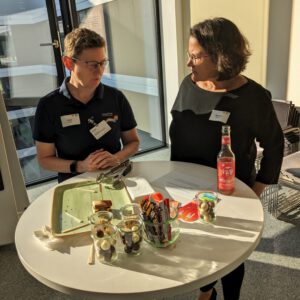
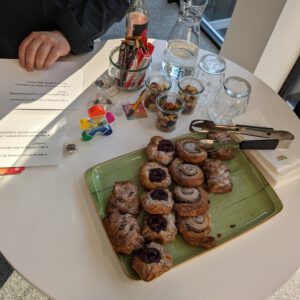
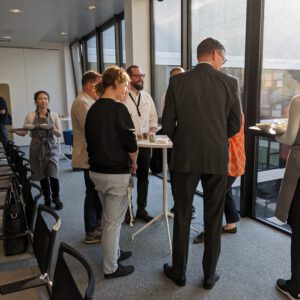
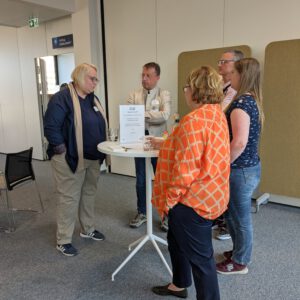
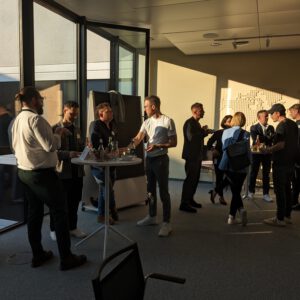
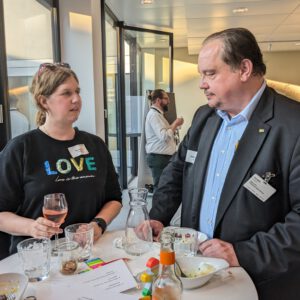
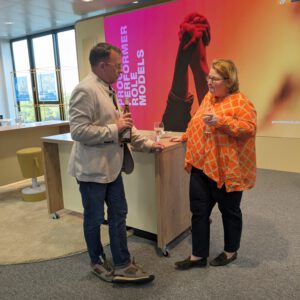
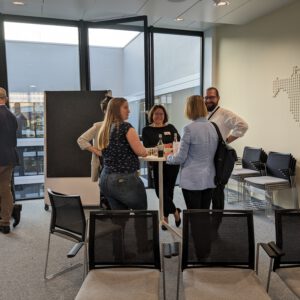
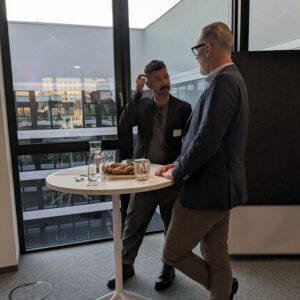
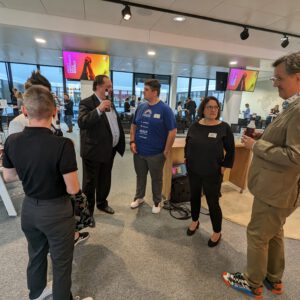
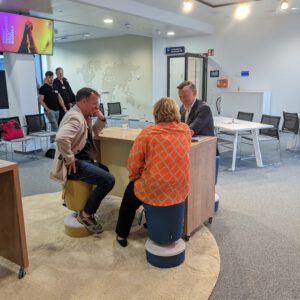
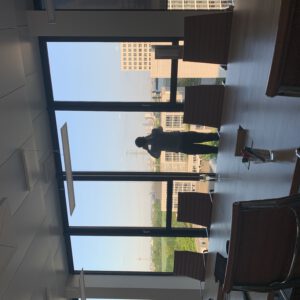
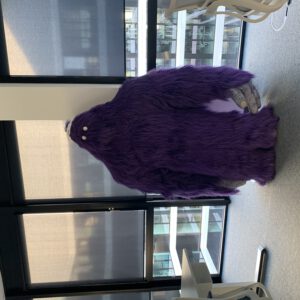
Kindly supported by
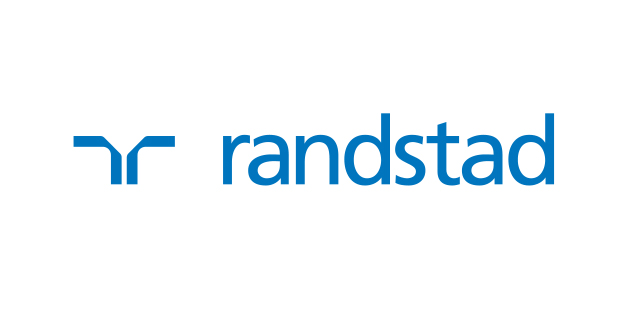

PROUT EMPLOYER BASF
„As long as we have not yet managed to create these conditions in the world of work and society for everyone, we will miss out on opportunities and not use our full potential.“
Katja Scharpwinkel was born in Hagen in 1969. She studied chemistry at the University of Münster and received her diploma in 1994, followed by her doctorate in 1996.
As a member of the Executive Board, she is responsible for European Site & Verbund Management; Global Engineering Services; Corporate Environmental Protection, Health, Safety & Quality and the Europe, Middle East, Africa region.
WHAT DOES IT MEAN FOR YOU AS SITE MANAGER FOR THE LUDWIGSHAFEN
SITE TO STAND UP FOR MORE QUEER DIVERSITY AND VISIBILITY?
Dr. Katja Scharpwinkel: In my role as site manager, it is my job to bring the team at the site together. With the challenges of the present and future, it is important that we are motivated and, above all, united in working towards our goals. This is only possible if no one has to struggle with reservations or artificial barriers. This applies not only in Ludwigshafen, but also in our private lives. An important step in breaking down reservations is exchanging ideas and getting to know each other. I want to help drive this forward – and I know that I am not alone in this, but have many committed people at my side – at BASF and in the PROUT AT WORK network.
WHAT DO YOU THINK OF THE STATEMENT THAT FROM NOW
ON MORE IMPORTANT ISSUES THAN QUEER DIVERSITY?
Dr. Katja Scharpwinkel: I think there is no point in weighing up issues that move and shape society against each other. We shouldn’t put climate protection and the necessary (energy) transformation on the back burner because of a pandemic or the wars in Ukraine and Gaza.
And so queer diversity remains as relevant as ever. For me, it also stands for tolerance, cohesion and humanity. These values are the basis of our coexistence in a democracy – we must protect them no matter what. Anything else would be a big step backwards for our society.
WHY IS IT A MATTER CLOSE TO YOUR HEART TO
SUPPORT QUEER DIVERSITY?
Dr. Katja Scharpwinkel: Like most people, I want to work in a company where I can be who I am. Only then can I be motivated and have fun, only then can and will I contribute my best. As long as we have not yet managed to create these conditions in the world of work and society for everyone, we will miss out on opportunities and not use our full potential. This is a situation that has been unacceptable not just since the skills shortage. That is why I am committed to diversity in both my private and professional life.
Dear Katja, thank you very much for the interview!
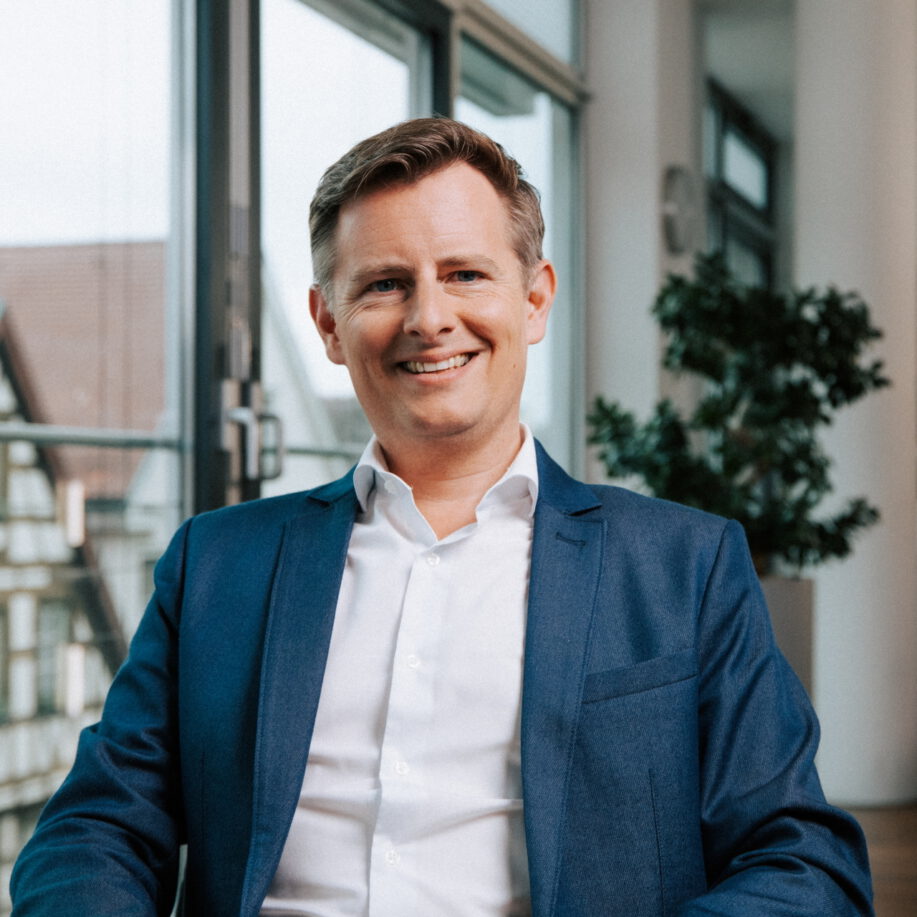
PROUT EMPLOYER BCG PLATINION
„By embracing diversity, we not only enrich our organizational culture but also drive innovation and creativity.“
Matthias Burghardt is an Associate Director at BCG Platinion and supports financial service providers in Central Europe with digital transformations. He studied Information Engineering and Management in Karlsruhe and earned a PhD in Business. Matthias heads the DE&I (Diversity, Equity & Inclusion) activities at BCG Platinion in Central Europe as well as the LGBTQ+ network Pride @ BCG Platinion in EMESA where all activities of the Pride members and allies are coordinated.
You were immediately willing to do a joint interview –
thank you again! Why is it a matter close to your heart or a
concern for you to support queer people in the workplace?
Matthias Burghardt: Supporting queer people in the workplace is crucial for me because it fosters a truly inclusive and respectful environment where every individual can thrive. By embracing diversity, we not only enrich our organizational culture but also drive innovation and creativity. It reflects a commitment to equality and human rights, ensuring that everyone, regardless of their sexual orientation or gender identity, has equal opportunities to succeed and contribute to our collective success.
Which initiatives regarding equal opportunities for queer
people in the workplace are you pursuing within your company?
Matthias Burghardt: We are committed to fostering equal opportunities for queer employees through a multifaceted approach. We are building a diverse workforce by actively recruiting from a wide range of backgrounds and promoting an inclusive environment where everyone can bring one’s true self to work. Our initiatives are centered around our close-knit Pride members and allies, creating a “secret sauce” where everyone finds community. We are also enhancing our external communications to reflect our commitment to LGBTQ+ inclusivity.
Which role do allies play in your organization and
how do you engage them in your LGBTQ+ initiatives?
Matthias Burghardt: Allies are incredibly important for the acceptance and inclusion of LGBTQ+ individuals. Especially allies who actively and strongly advocate for queer issues are essential for LGBTQ+ people to feel fully accepted at work. We understand the importance of an inclusive atmosphere among employees, achievable only by integrating the issue into our company culture. Allyship is more than just changing the company flag on LinkedIn or hosting an annual fair. Allies are an integral part of our Pride Community.
What motivated BCG Platinion to become a PROUT EMPLOYER
and what would you like to see in our cooperation?
Matthias Burghardt: Our motivation to become a PROUT EMPLOYER stems from a deep commitment to fostering an inclusive workplace that celebrates diversity and supports the LGBTQ+ community. We aim to lead by example, promoting equality and understanding. In our cooperation, we aspire to share best practices, innovate in diversity initiatives, and create a broader impact through community engagement, advocacy, and awareness programs. Together, we can build a more inclusive world where everyone is empowered to succeed.
What advice would you give to other companies
that have not yet discovered queer diversity for themselves?
Matthias Burghardt: Embrace queer diversity as an asset. It enriches your company culture, drives innovation, and appeals to a broader customer base. Start by creating a safe, inclusive environment where all voices are heard and valued. Invest in diversity training, support LGBTQ+ employee networks, and commit to equitable policies. Learning from and partnering with organizations like PROUT AT WORK can accelerate your journey. Diversity isn’t just right; it’s smart business. Don’t get left behind.
Dear Matthias Burghardt, thank you very much for the interview!
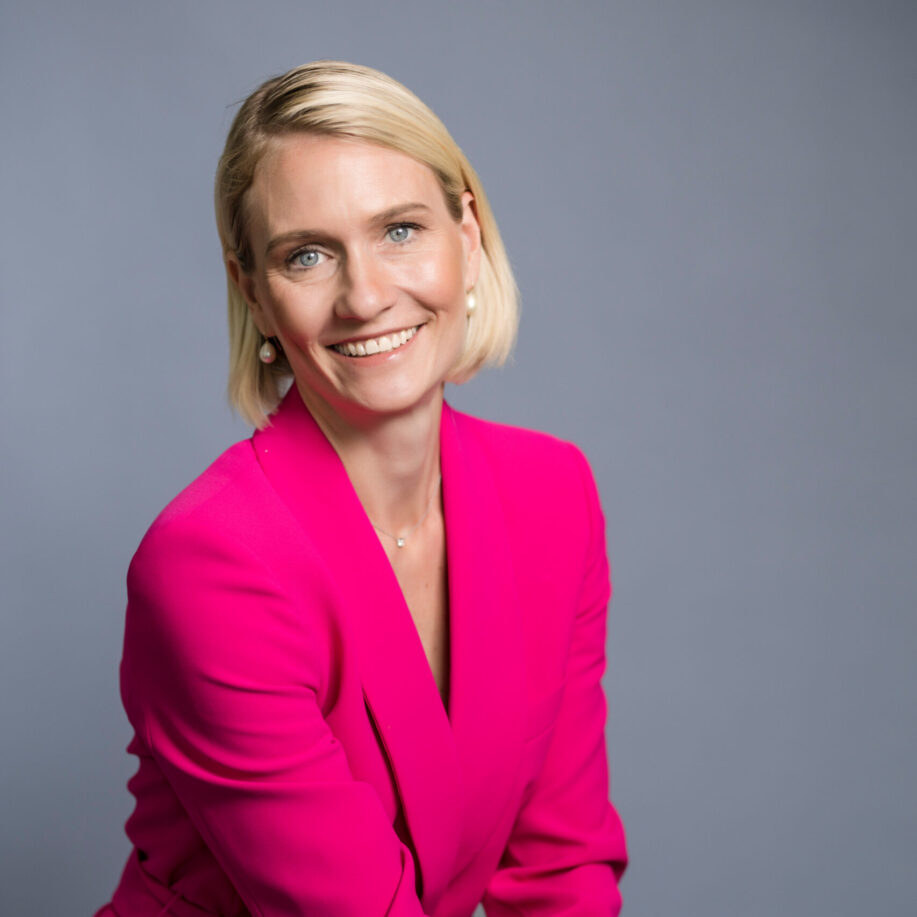
PROUT EMPLOYER Sanofi
“As a sponsor of the network, the queer community is particularly close to my heart. Neither at Sanofi nor in the rest of society can we do without diversity and talent of any sexual orientation, religion, age or origin.”
Dr. Theresa von Fugler is a biochemist, “doer” and family person. As an executive with global experience in the branded goods industry, she has been Managing Director at Sanofi Consumer Healthcare in Germany since September 2021. She is responsible for the area of over-the-counter medicines from pharmacies. This includes brands for the treatment of headaches, coughs, abdominal pain, constipation and allergies. She is a sponsor of the internal LGBT*IQ network in Germany and is particularly committed to diversity in the workplace. In her private life, Theresa is active in sports and finds variety in beekeeping.
Sanofi’s global diversity strategy is called “all in”.
What does this slogan mean to you?
Dr. Theresa von Fugler: As the name suggests, for me “all in” is a positive term for the fact that people of every dimension of diversity can develop here. Sanofi’s employees in Germany are a reflection of society – people of different backgrounds, experiences, attitudes and skin colors work here. We want to be as diverse as the patients we serve.
The equal opportunities development of all employees is part of our corporate culture and a strategic success factor. Inclusion is not a minority program. We want a working environment in which everyone feels valued and supported without any form of discrimination.
Which initiative or action on equal opportunities for
queer people at Sanofi that particularly impressed you?
Dr. Theresa von Fugler: I was fascinated by the Sanofi truck at Christopher Street Day 2023. The passion and joy with which our team took part in the CSD inspired many people to be there too. Showing our colors on this day was a clear commitment to LGBT*IQ and “all in”. Miraculously, our LGBT*IQ network has since grown to include more members. For me, this is an important message – because diversity should have a positive connotation. It’s not for nothing that an expressive and colorful symbol – the rainbow – stands for the LGBT*IQ community worldwide.
In your opinion, what are the big issues and
challenges regarding queer diversity in the
coming years?
Dr. Theresa von Fugler: The area of tension associated with LGBT*IQ diversity is particularly challenging. This affects Sanofi just as much as society as a whole. On the one hand, it is important to encourage people to embrace their uniqueness, which above all requires acceptance and a matter of course. On the other hand, there are people who are bothered by measures to strengthen LGBT*IQ diversity – regardless of whether they come into direct or indirect contact with them. This reinforces the social tension.
What motivated Sanofi to become a PROUT EMPLOYER
and what would you like to see in our cooperation?
Dr. Theresa von Fugler: When we founded our internal LGBT*IQ network “PRIDE+ DE”, it was clear to us right from the start that we wanted to bring in external support and expertise. The aim at the start was to further develop the quality of the network’s work and growth. Every network has a learning curve right from the start. With a strong partner, we wanted to avoid initial mistakes and act strategically. It is also good to network across company boundaries in order to learn from each other and strengthen each other in our day-to-day work.
What advice would you give to other companies
who have not yet discovered queer diversity for themselves?
Dr. Theresa von Fugler: As a sponsor of the network, the LGBT*IQ community is particularly close to my heart. Neither at Sanofi nor in the rest of society can we do without diversity and talent of any sexual orientation, religion, age or origin. But only when opportunities are fairly distributed can talents develop their full potential. Diverse groups help to break down barriers in people’s minds and obstacles in everyday working life.
One thing is certain for me: surrounding ourselves with diverse and different people helps us all move forward, I’m sure of that.
Dear Dr. Theresa von Fugler, thank you very much
for the interview!
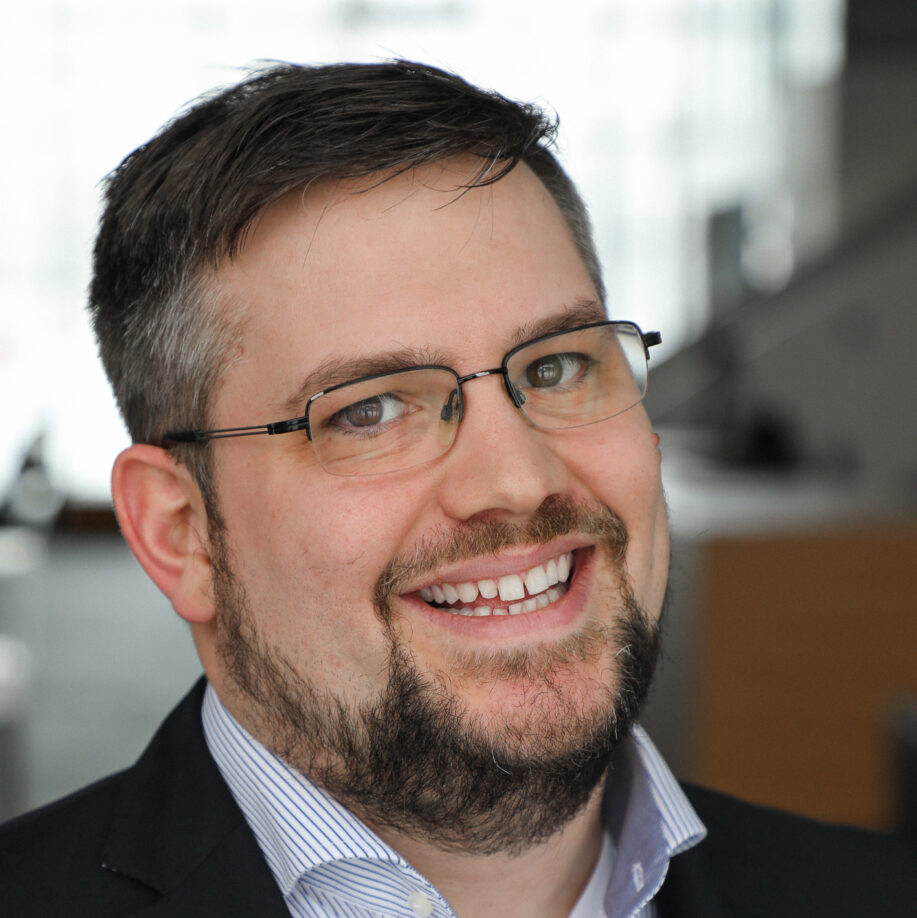
PROUT EMPLOYER Infineon Technologies AG
“I am striving to live and promote the value of diversity in my direct area of responsibility, but do not shy away from supporting beyond that.”
Raphael joined Infineon in May 2016 as a Senior Expert for Ethical Hacking and Incident Management. Before joining Infineon, he worked as a Security Consultant for various national and international companies. In 2017 Raphael took over his first management role at Infineon setting up the Cyber Defense Center as a global team. In 2020 he then took over as Head of the Cyber Security team – in June 2023 the role has been extended to cover all security topics as Head of the newly merged Cyber & Corporate Security teams. Raphael was always part of multinational teams and companies which he enjoyed a lot.
Raphael graduated from University of Tübingen in 2013, where he studied Computer Science. He is married and has two children, lives in Munich but was born in Baden-Wuerttemberg. Fun Fact: His swabian is as bad as his “Hochdeutsch” ;).
You were immediately ready for an interview
– thank you again for that!
Why is it important for you to support queer topics?
Raphael Otto: Diversity in all dimensions; gender, nationality, physical / mental ability or sexual orientation, just to name a few, is very close to my heart. I believe that as a society we benefit from different perspectives. I also believe that as an employer we have a responsibility when it comes to living and promoting our values. I am striving to live and promote the value of diversity in my direct area of responsibility, but do not shy away from supporting beyond that. So, when I was asked if I would be available as a sponsor to our LGBT* & Friends Community, I felt very honored and agreed immediately.
What initiative related to equal opportunities
for queer people was successful at Infineon?
Raphael Otto: In June, during Pride Month, Infineon participated in several pride parades (e.g. Munich) to show support and raise awareness for the LGBTQIA+ community, their history, culture and ongoing work for equal opportunities. The very positive feedback we received from our employees and external stakeholders has shown that our commitment is well received and motivates us to continue with our support for LGBTQIA+.
What are your wishes and goals in your role as sponsor
for the Infineon LGBT* & Friends community?
Raphael Otto: While the LGBT* & Friends Community already achieved a lot, we are still in the beginning of a journey here at Infineon. My wish is to support the community by providing advice, visibility and hands-on support during various activities and events. In particular I want to support the colleagues when addressing LGBTQIA+ inclusion globally. As we are a globally operating company, we face the reality of different levels of awareness and acceptance of LGBTQIA+ issues which can be challenging for our internal community. I hope I can help with that and advocate for them.
How do you react when people question
the importance of queer inclusion?
Raphael Otto: As for every dimension of diversity and inclusion I am typically trying to listen to the argumentation behind the reservation first. I will challenge the arguments highlighting the importance of diversity for successful teams and the need for all humans to feel a sense of belonging and acceptance in society and of course in the workplace. I make clear that everyone wants to be accepted as they are and that this is a human right which should not be questioned.
What motivated Infineon to become a PROUT EMPLOYER
and what would Infineon like to see in this cooperation?
Raphael Otto: At Infineon, we want to offer a workplace where everyone is accepted, feels a sense of belonging and can bring their authentic self to work. Participating in the PROUT EMPLOYER Program is a great chance for us to express our commitment to Diversity & Inclusion and to further increase our knowledge about how to support Infineon’s LGBTQIA+ members as a PROUT EMPLOYER. We are very happy about the cooperation with PROUT AT WORK, which will accompany us with their expertise to create the best Infineon for people of any sexual orientation, gender identity or gender expression.
Dear Raphael Otto,
thank you for the interview!
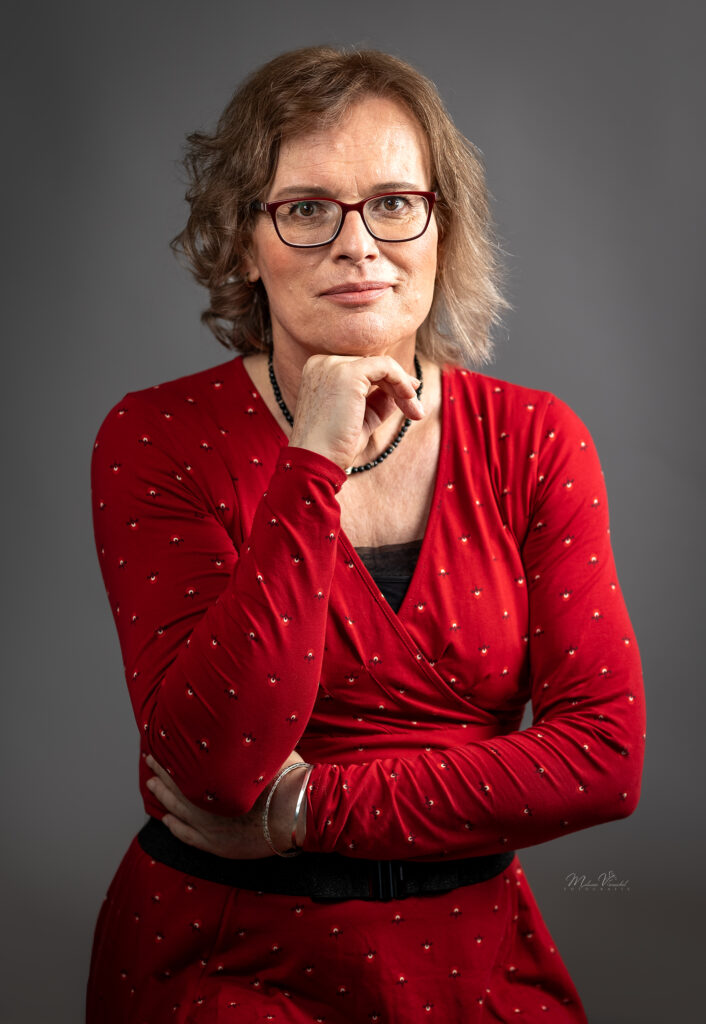
MYSTORY with …
marit
60 years, ludwigsburg
“Trans* is something wonderful – this sentence sums up what I call gender euphoria.”
Published: January 2024
There are many coming out stories and for most trans* people they are amazingly similar, even though we all have very individual paths. That’s why I don’t want to go into my various coming-out stories.
I am 60 years old and have been living openly as a woman for almost four years – 24 hours a day, 365 days a year. My environment had to experience this quite abruptly. Apart from my partner and a few trusted people, nobody was prepared. Nevertheless, hardly anything changed for anyone when I suddenly walked out the door as a woman. Here I would like to describe what inspired me on my journey and what brought my life out of the gray area.
Trans* is something wonderful – this sentence sums up what I call gender euphoria.
My first appearance as a woman at a seminar group meeting was a big moment for me. Apart from a brief email, I hadn’t let anyone know about my change beforehand. As I hadn’t seen some of the participants for a while, not everyone recognized me straight away – but I felt the same way. I was initially taken aback, but then the ice was broken and the unanimous opinion was that the ladies present (including me) had held up better than the more or less aged men. When I was accepted into the group of women as a matter of course, it was clear that I had arrived in my own world.
Hormone therapy wasn’t actually my goal, but I didn’t want to lose my hair, so I agreed to replace testosterone with oestrogen. What I didn’t know was that it wasn’t just my body that would change and suddenly become sensitive to cold and less strong. I was also suddenly able to perceive and allow my feelings. Sometimes I stood in the kitchen and had tears in my eyes for no external reason – with happiness that all this was still possible for me, which I would never have expected before. Later, there were also sad occasions to cry, such as goodbyes or broken friendships.
Self-confidence was never my thing as a man. Why should I be, I was a creature that wasn’t at peace with myself. I was always defensive, afraid of making mistakes or embarrassing myself. I was almost invisible because of my caution.
As a woman, I now have the courage to do things, make decisions and accept help. Why? What could happen if something goes wrong? After all, I am a human being with strengths and weaknesses and I am allowed to make mistakes, but also to be successful.
This was most noticeable at work. My colleagues accepted me, even though I often went out on a limb and sometimes had to back down.
Are women at a disadvantage compared to men at work? Yes, and this is mainly due to structural reasons rather than differences in personality. Nevertheless, as a late-career woman with a male socialization, I always automatically see the (working) world from two perspectives. On the one hand, I know the “typical male” behavioral patterns such as competitive thinking or fear of failure and can adapt to them. On the other hand, in recent years I have developed “typically female” characteristics such as communication skills, empathy and a willingness to cooperate, and I consciously use these to achieve the respective team goal. It never ceases to amaze me that I am much more effective in my working environment as a woman than I was previously in my imposed male role.
An important prerequisite for my transition was the support I received from my employer. The management’s statement in favor of diversity and against discrimination allowed me to embark on my journey without any existential fears. However, I received hardly any support with the practical implementation. I had to work out every step myself and obtain the necessary information. I also had no role models in my working environment apart from a colleague in the queer company network who had managed to change her first name.
I wanted to improve this situation and started offering online training sessions on the topic of transgender and also wrote a company guide. My presentations are now well attended and contribute to the visibility of transgender issues in the workplace. They bring the topic out of the dark taboo corner. We have received a lot of positive feedback on our transgender guide and an English-language version is due to be published soon. Volunteers have already come forward to translate it into other national languages.
Positive visibility has increasingly become a matter close to my heart. There is already enough negative visibility for trans* people and I want to do something about it.
So I started to offer my experience in the corporate environment as a consulting service for other companies. However, visibility or reach is crucial in online business and I still have a lot to achieve in this area. My new project has potential, but still has a long way to go.
I would like to conclude my thoughts with a personal experience that has shown me that I am on the right path. A few weeks ago, I saw an attractive woman through a window in a building with lots of glass. Only the upper half of her face was visible and she maintained intense eye contact. I immediately liked her and wanted to reach out and speak to her. As I started to move, I realized that I already knew her. This woman was me – reflected in the window glass at dusk.
There are many beautiful, small and big events and developments on my path – just like on the path of all other trans* people. I would like to share this here in order to focus on the positive in these difficult times.
dear marit, thank you very much for YourStory!
Wir haben uns dazu entschieden, uns vom Begriff „LGBT*IQ“ zu verabschieden. Das Spektrum erweitert sich stetig und es ist uns wichtig, alle sexuellen Orientierungen und geschlechtlichen Identitäten in unserer Kommunikation einzuschließen.
Stattdessen verwenden wir ab diesem Jahr den Begriff „Queer“. Queer ist ein Sammelbegriff für alle Personen, deren geschlechtliche Identität und/oder sexuelle Orientierung nicht zweigeschlechtlich, cis-geschlechtlich und/oder heterosexuell ist.
Der Begriff zeichnet sich dadurch aus, dass er Identitäten nicht scharf abgrenzt, sondern dass seine Bedeutung sich ständig verschiebt. So stellen wir sicher, dass wir wirklich alle Personen ansprechen und niemanden exkludieren.
Aus unserem Slogan „LGBT*IQ geht alle an.“ wird „Queer geht alle an.“ – denn es geht uns ALLE an!
“Wir haben im Laufe der letzten Jahre vermehrt Anfragen bekommen, ob wir unser Akronym ‘LGBT*IQ’ erweitern können. Da wir niemanden in unserer Kommunikation ausschließen wollen – das mit dem Akronym aber immer schwieriger umzusetzen ist – haben wir uns für den Begriff ‘Queer’ entschieden”, so Albert Kehrer, Vorstand der PROUT AT WORK-Foundation. “Der Begriff taucht auch in politischen Diskussionen vermehrt auf und wird insbesondere von rechts-konservativen Politiker_innen verstärkt abgelehnt – weshalb wir damit auch ein Zeichen setzen wollen: Wir unterstützen die gesamte Community, einschließlich aller geschlechtlicher Identitäten und sexueller Orientierungen!“
Ihr habt Fragen dazu? Schickt uns gerne eine Nachricht über unsere Social-Media-Kanäle oder eine E-Mail an info@proutatwork.de.
Show Your true colors!
Das Interview mit Julia wurde für den PRIDE DAY GERMANY 2024 geführt.
Wie zeigt Ihr queeren Menschen an Eurem Arbeitsplatz, dass sie in ihrer ganzen Authentizität willkommen sind?
Am 04. Juli feiern wir den PRIDE DAY GERMANY. Der Aktionszeitraum ist jedoch länger geöffnet! Noch bis zum 25. Juli könnt Ihr Eure Aktivitäten für Queer Diversity einreichen und habt damit die Chance zum PRIDE DAY CONTEST Publikumsliebling zu werden! Im sechswöchigen Aktionszeitraum zeigen wir jährlich Eure Firmenaktionen für Queer Diversity auf unserer Website und Eure Kommunikation auf unserer Social Media Wall. Im anschließenden
PRIDE DAY CONTEST führen wir ein Publikumsvoting durch und küren die drei Aktionen mit den meisten Stimmen zu Publikumslieblingen!

MYSTORY mit …
julia
29 Jahre, düsseldorf
„sich über erlebnisse, Gedanken, empfindungen, gefühle und wahrnehmungen auszutauschen und dabei eine verbindung zu menschen zu spüren, ist ein aspekt von vielfalt, auch geschlechtlicher vielfalt, den ich sehr wertvoll finde.”
Veröffentlicht: Dezember 2023
Zuerst ein paar Fakten über mich: Ich bin 29 Jahre alt, trans* und lebe seit etwas mehr als fünf Jahren als Frau. Aufgewachsen bin ich in einer Kleinstadt in Süddeutschland, wohne aber nach einigen Stationen hier und da mittlerweile in Düsseldorf. Dort arbeite ich bei einem Versicherungsunternehmen als Aktuarin und bin im LGBTIQ+ Mitarbeitenden-Netzwerk aktiv.
Als Aktuarin beschäftige ich mich viel mit Formeln und Zahlen. Ich setze mich zum Beispiel mittels mathematisch-statistischer Methoden mit der Modellierung, Bewertung und Steuerung von Risiken auseinander – bin also ziemlich rational im Job unterwegs. Gleichzeitig freue ich mich als Teil des LGBTIQ+ Netzwerks über jeden Austausch mit Menschen, um Gedanken, Gefühle und Perspektiven besser verstehen zu können, insbesondere zu Themen aus dem Bereich DEI (Diversity, Equity and Inclusion) und LGBTIQ+. Daraus können viele Ideen und Verständnis entstehen und ein gemeinsames, inklusives Miteinander wachsen. Beide Seiten der Arbeit machen mir viel Spaß!
Im Umgang mit geschlechtlicher Vielfalt am Arbeitsplatz stehen für mich folgende Fragen im Fokus:
- Schweigt man über einen wichtigen Teil der eigenen Identität oder kann man offen damit umgehen?
- Kann man ein authentisches Selbst mit der Welt, den Mitmenschen und den Personen im Arbeitsumfeld teilen?
- Wird man angenommen, wie man ist?
- Funktioniert der Arbeitsplatz als System für eine Person?
- Wird inklusiv mit Personen, Identitäten und ihren verschiedenen Bedürfnissen umgegangen?
Es geht um die Fragen: Wer bin ich? Wer möchte ich sein? Und dann auch: Kann ich diese Person am Arbeitsplatz sein? Diese Fragen sind sehr tiefgreifend. Das zu erkunden und herauszufinden war ein langer Weg für mich, der auch nie wirklich zu Ende sein wird, denke ich. Ein essenzieller Teil meines Weges waren die Menschen, die ich um mich hatte.
Für mich ist meine Identität als Frau, mein trans* Sein, mein Hier und Jetzt auch stark mit Menschen verbunden: mit meiner Schwester; mit Freundschaften, die mich schon lange begleiten; mit Menschen, die sichtbar waren und Raum eingenommen haben. Sie haben mir das Gefühl gegeben, die Freiheit zu haben, mich ausprobieren zu können, ohne dafür verurteilt zu werden.
Sie haben manche Fragen gestellt, aber gleichzeitig oftmals keine Fragen gestellt und mein Sein sich einen Weg bahnen lassen. Das Gefühl, wenn sich etwas richtig anfühlt, ist unglaublich erfüllend und überwältigend. Dieses Gefühl musste ich zulassen können. Mit diesen Menschen habe ich viele dieser Momente zusammen erleben dürfen: gemeinsam Sport zu machen, den eigenen Körper wahrzunehmen und eine Beziehung dazu aufzubauen, den Körper als Medium des Ausdrucks zu nutzen, zu tanzen; Kleidung, Make-Up, Musik und Kunst als Interaktion mit der Außenwelt zu sehen und zu nutzen. In ihrer Vielfalt können sie so viel ausdrücken: Freude, Freiheit, Stärke und das Gefühl, die Welt umarmen zu wollen – aber genauso Ruhe, Schwäche, Trauer und das Gefühl, sich unter einer Decke verkriechen zu wollen. All das hat eine Dynamik in sich, die mir sehr viel gegeben und mir geholfen hat, die Fragen „Wer bin ich? Und wer möchte ich sein?“ zu erkunden.
Dabei führe ich gern Gespräche auf einer sehr menschlichen Ebene, die etwas Verbindendes ist, ohne dass man sich lange kennt. Menschlichkeit zu spüren und sich zuzuhören kann viel verändern: Man wird sich besser der eigenen Perspektive bewusst und erkennt auch eigene Privilegien. Gleichzeitig erweitert man die eigene Perspektive und sieht auch die Zusammenhänge und systemischen Aspekte. Sich über Erlebnisse, Gedanken, Empfindungen, Gefühle und Wahrnehmungen auszutauschen und dabei eine Verbindung zu Menschen zu spüren, ist ein Aspekt von Vielfalt, auch geschlechtlicher Vielfalt, den ich sehr wertvoll finde.
Liebe julia, vielen Dank für YourStory!
PRIDE DAY GERMANY 2024 & PRIDE DAY CONTEST
Hier geht’s zu allen Infos und zur Anmeldung.
Show Your true colors!
Das Interview mit Emre wurde für den PRIDE DAY GERMANY 2024 geführt.
Wie sorgt ihr an Eurem Arbeitsplatz für eine offene und wertschätzende Kultur?
Am 04. Juli feiern wir den PRIDE DAY GERMANY. Der Aktionszeitraum ist jedoch länger geöffnet! Noch bis zum 25. Juli könnt Ihr Eure Aktivitäten für Queer Diversity einreichen und habt damit die Chance zum PRIDE DAY CONTEST Publikumsliebling zu werden! Im sechswöchigen Aktionszeitraum zeigen wir jährlich Eure Firmenaktionen für Queer Diversity auf unserer Website und Eure Kommunikation auf unserer Social Media Wall. Im anschließenden
PRIDE DAY CONTEST führen wir ein Publikumsvoting durch und küren die drei Aktionen mit den meisten Stimmen zu Publikumslieblingen!

MYSTORY mit …
emre
32 Jahre, berlin
„wenn mich menschen fragen, wie ich meinen erfolg erreicht habe,
antworte ich, dass er auf meinen erfahrungen mit trauma beruht.”
Veröffentlicht: Dezember 2023
Als ich mich damals bei meiner alleinerziehenden Mutter geoutet habe, wusste sie nicht viel damit anzufangen, weil sie eine gleichgeschlechtliche Partnerschaft nicht kannte. Nach einigen Erklärungsversuchen meinte sie nur: „Emre, schon dein ganzes Leben lang wusstest du, das Gute vom Schlechten zu unterscheiden und immer den richtigen Weg einzuschlagen. Wenn diese Lebensform das Richtige für dich ist, dann unterstütze ich dich dabei.“ Das war wirklich einer der schönsten Momente in meinem Leben und hat die Bindung zwischen meiner Mutter und mir gestärkt. Denn es war nicht immer einfach …
Ich habe kein Abi, sondern nach dem qualifizierenden Hauptschulabschluss die Mittlere Reife und anschließend eine Ausbildung zum Personaldienstleistungskaufmann absolviert. Berufsbegleitend habe ich eine Weiterbildung zum Fachwirt gemacht und somit meine Hochschulzulassung erlangt. Sowohl meinen Bachelor of Law als auch meinen Master of Science in HR habe ich neben meinem Job gerockt.
Studieren und nebenher ein wenig zu jobben war für mich nicht drin, da ich die finanzielle Absicherung nicht hatte. Daher kam für mich nur ein Vollzeitjob infrage, den ich um ein Studium am Abend und am Wochenende ergänzt habe.
Viel Freizeit hatte ich damals nicht, aber es war schon immer mein Lebenstraum, zu studieren. Aus meiner damaligen Sichtweise habe ich ein Studium immer mit einem Privileg für Personen aus gutem familiärem Umfeld mit entsprechendem finanziellem Background verbunden.
In meinem Leben hatte die ethnische Diskriminierung zur Folge, dass mir zum Beispiel auf der Schule gesagt wurde, dass ich mit meiner ‚Herkunft‘ nicht viele Chancen haben werde. Außerdem habe ich zwei Ausbildungen abgebrochen, weil ich wegen meiner Armutsbiografie und meiner Nicht-Binärität extreme Formen von Klassismus und Homofeindlichkeit erlebt habe. Heute arbeite ich bei Google, lebe offen nicht-binär, bin als Antidiskriminierungsexperte tätig und mehrfach ausgezeichnet worden. Ich spreche als Experte mit Ministerien und den größten Konzernen der Welt.
Wenn mich Menschen fragen, wie ich meinen Erfolg erreicht habe, antworte ich, dass er auf meinen Erfahrungen mit Trauma beruht. In unserer Gesellschaft muss man außergewöhnlich sein, um existieren zu dürfen, und ich habe gelernt, damit umzugehen.
Daneben bin ich auch leidenschaftlicher Fußballspieler. Ich habe während meiner Zeit in München im ersten schwulen Fußballteam Deutschlands gespielt und mich dabei für LGBTQIA+ im Sport engagiert. Ganz aktuell habe ich den Verein ‚WeSpeakYouDonate‘, der sich für Vielfalt einsetzt, und ‚Occtopus‘ gegründet. Occtopus ist ein Unternehmen, das Kinderspiele entwickelt, um Vorurteile und Stereotype bei Kindern und Eltern aufzudecken. Darüber hinaus bin ich auch Content Creator auf LinkedIn und betreue meinen eigenen YouTube-Kanal ‚Emres Pink Pillow‘.
Aufgeben stand für mich nie zur Debatte. Ich habe mich immer wieder selbst motiviert und einfach weitergemacht.
Lieber emre, vielen Dank für YourStory!
PRIDE DAY GERMANY 2024 & PRIDE DAY CONTEST
Hier geht’s zu allen Infos und zur Anmeldung.
Show Your true colors!
Das Interview mit Anastasia wurde für den PRIDE DAY GERMANY 2024 geführt.
Wie sorgt Ihr dafür, dass trans* Menschen an Eurem Arbeitsplatz vor Diskriminierungen geschützt werden?
Am 04. Juli feiern wir den PRIDE DAY GERMANY. Der Aktionszeitraum ist jedoch länger geöffnet! Noch bis zum 25. Juli könnt Ihr Eure Aktivitäten für Queer Diversity einreichen und habt damit die Chance zum PRIDE DAY CONTEST Publikumsliebling zu werden! Im sechswöchigen Aktionszeitraum zeigen wir jährlich Eure Firmenaktionen für Queer Diversity auf unserer Website und Eure Kommunikation auf unserer Social Media Wall. Im anschließenden
PRIDE DAY CONTEST führen wir ein Publikumsvoting durch und küren die drei Aktionen mit den meisten Stimmen zu Publikumslieblingen!

MYSTORY mit …
anastasia
49 Jahre, berlin
„meine nicht-anpassung, mein sichtbarer ausdruck als gender non-conforming, nimmt mir nicht mein frausein.”
Veröffentlicht: November 2023
Ich weiß nicht wirklich, wann meine bewusste und beschwerliche Reise zu mir selbst begonnen hat. Ich bin mir auch gar nicht sicher, ob das der entscheidende Punkt für diese Geschichte ist. Wenn ich auf mein Leben zurückblicke, erkenne ich heute, dass ich unterscheiden muss und möchte zwischen dem Weg zu mir hin als transgeschlechtliche Frau und meinem Leben als trans* Frau. Diese Unterscheidung ist mir persönlich wichtig, denn das Leben nach dem Coming Out 2015 hat mich als trans* und queere Person deutlich mehr geprägt als alles andere davor.
Mit 17 Jahren fand ich mich im Kleiderschrank meiner Mutter wieder und fühlte etwas Unerklärliches.
Immer mehr keimte in mir die Gewissheit, dass ich eben nicht der Mann bin, den die Welt in mir sieht und mich entsprechend als solchen behandelt. Ich konnte und wollte mit diesen Gefühlen nicht umgehen. Ich drängte meine wahre Identität zurück und zwang mich in die klassischen heteronormativen Muster. Mit Mitte zwanzig heiratete ich meine erste Frau. Zu dem Zeitpunkt war ich auch bereits Soldat in der Bundeswehr. Ich wurde 1994 eingezogen und entschloss mich dann für die Offizierslaufbahn. Zwei Institutionen, die in mir beide einen Mann sahen und stets erwarteten, prägten mein Leben. Im Verdrängen meiner Bedürfnisse war ich gut. Das Fehlen von trans* Vorbildern in der Gesellschaft verstärkte in mir das Bedürfnis, aktiv gegen mein inneres Ich vorzugehen. Scham und Abscheu gegen mich selbst waren meine ständigen Begleiter.
2015 durchbrach ich endlich dieses Muster. Ich konnte nicht mehr und wollte auch nicht mehr. Es war kein Mut, sondern Verzweiflung. Ich wollte endlich leben. Ich wollte ich sein. Mit diesem Schritt fing die zweite Phase an. Noch während der Transition merkte ich, dass ich zwar ich sein konnte, aber auch dieser Weg von Hindernissen und einer nicht immer akzeptierenden Gesellschaft geprägt war. Ich wollte sichtbar sein für andere trans* Personen. Ich wollte ein Orientierungspunkt für andere sein, meine Geschichte erzählen. Dieser Gedanke erweckte unwahrscheinlich viel Kraft in mir. Ich engagierte mich mehr und mehr und wurde langsam zu einer Aktivistin für trans* und queere Rechte – sowohl an meinem Arbeitsplatz als auch außerhalb der Gesellschaft.
Ich wehrte mich weiterhin gegen fremdbestimmte Zuschreibungen und Rollenerwartungen an mein nach außen gelebtes, weibliches Geschlecht. Ich habe genug davon, ständig daran gemessen zu werden, wie weiblich ich auf Dritte wirke.
Welche Attribute an mir, an meinem Körper, mich in der Fremdwahrnehmung als Frau bestätigen und welche den Hinweis auf meine nicht-cis-Natur geben. Ich bin froh, endlich an dem Punkt angekommen zu sein, der Bestätigung durch andere nicht länger zu bedürfen. Jahrelang hat mich das Gefühl, äußerlich nicht als Frau bestehen zu können, in meiner Identität zurückgehalten. Und meine nicht-Anpassung, mein sichtbarer Ausdruck als gender non-conforming, nimmt mir nicht mein Frausein.
Ich bin Anastasia, 49, bunt, laut und queer. Ich bin ein Einhorn in Flecktarn und kämpfe bis zum Äußersten für die Sache, an die ich glaube. Revolution statt Evolution.
Liebe anastasia, vielen Dank für YourStory!
PRIDE DAY GERMANY 2024 & PRIDE DAY CONTEST
Hier geht’s zu allen Infos und zur Anmeldung.
